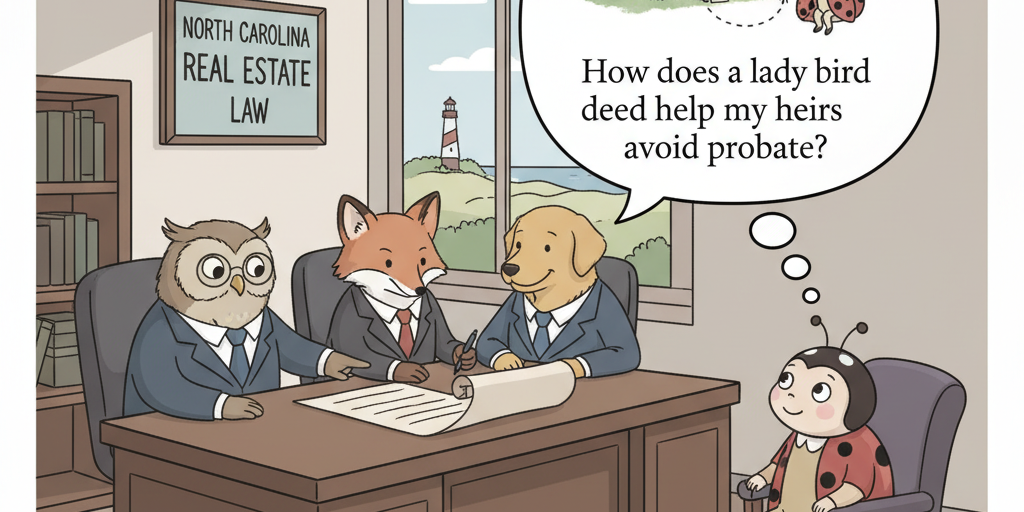How does a lady bird deed help my heirs avoid probate? – North Carolina
Short Answer
In North Carolina, a lady bird deed (also called an enhanced life estate deed) lets you keep full control of your property for life and name who takes it at your death. Because your ownership ends at death and the remainder owners take title automatically, that real estate does not pass through probate. You must properly sign and record the deed with the county Register of Deeds before death for it to work as intended.
Understanding the Problem
You want to know whether using a lady bird deed in North Carolina can keep your coastal property out of probate so your chosen heirs receive it smoothly. The question is whether you can keep lifetime control and still avoid the court process at death. Here, the owner is the actor; the action is signing and recording an enhanced life estate deed; the key trigger is the owner’s death.
Apply the Law
Under North Carolina law, title to real property is handled differently from personal property at death. A lady bird deed is a present conveyance of a remainder interest to your beneficiaries while you retain an “enhanced” life estate. Enhanced means you keep the right to live there, sell, mortgage, lease, or change beneficiaries without their consent. If you still own the property at death (you did not sell or otherwise cut off the remainder), your life estate ends and the remainder owners take title automatically. Because the estate does not own that real estate at death, it typically does not go through probate. Recording with the county Register of Deeds is essential to protect the transfer against later purchasers or lien creditors.
Key Requirements
- Retain an enhanced life estate: Your deed must reserve your lifetime possession and broad powers to sell, mortgage, or change beneficiaries without their consent.
- Name remainder beneficiaries now: The deed identifies who takes title at your death if you still own the property.
- Execute and record: Sign before a notary and record the deed with the Register of Deeds in the county where the property is located.
- Automatic transfer at death: If not previously conveyed, your life estate ends at death and the remainder vests in your named beneficiaries outside probate.
- Subject to liens and claims: Existing recorded liens and valid creditor rights are not erased; improper transfers can be challenged in limited circumstances.
What the Statutes Say
- North Carolina Gen. Stat. § 47-18 (Recording required to protect title) – Unrecorded deeds are generally void against lien creditors and purchasers for value.
- North Carolina Gen. Stat. § 28A-15-2 (Title to property at death) – Explains when title to real property vests at death.
- North Carolina Gen. Stat. § 28A-15-1 (Estate assets for payment of claims) – Real property owned by the decedent can be used to pay debts unless excluded by law.
Analysis
Apply the Rule to the Facts: You want to prepare an enhanced life estate deed for your coastal North Carolina property. If you sign and record a properly drafted lady bird deed reserving full lifetime powers, your chosen beneficiaries will take title automatically at your death without a probate filing for that parcel. If you later sell or mortgage the property during life, you can do so without their consent, and that action may cut off or change their remainder.
Process & Timing
- Who files: The property owner. Where: Register of Deeds in the North Carolina county where the property is located. What: A signed and notarized enhanced life estate (lady bird) deed using the property’s legal description; include any county-required cover sheet and tax/excise information. When: Record as soon as you decide to use this tool; it must be recorded before death to be effective against purchasers and lien creditors.
- After recording, keep a copy with your estate records. Coordinate with any lender or association if covenants, dues, or loan terms could be impacted; some counties process recording the same day.
- At death, the remainder owners typically record a certified death certificate or brief affidavit to update the chain of title. No probate order is needed for this property.
Exceptions & Pitfalls
- If the deed is not recorded in the correct county, the transfer may not be protected against third parties.
- Existing liens, property taxes, and association dues follow the land; beneficiaries take subject to those obligations.
- If you later convey or mortgage the property, you can cut off or change the remainder; keep documents consistent with your intent.
- Transfers intended to hinder creditors can be challenged; consult counsel if there are significant debts.
- If the property is already held with a right of survivorship, a lady bird deed may be unnecessary.
Conclusion
In North Carolina, a properly drafted and recorded lady bird deed lets you keep full control of your real estate for life and have it pass automatically to your named beneficiaries at death, outside probate. The key is reserving enhanced lifetime powers and recording the deed with the county Register of Deeds before death. Next step: have a North Carolina attorney prepare and record an enhanced life estate deed for your coastal property.
Talk to a Real Estate Attorney
If you’re deciding whether a lady bird deed fits your North Carolina coastal property and want clear steps to record it correctly, our firm has experienced attorneys who can help you understand your options and timelines. Call us today at [919-341-7055].
Disclaimer: This article provides general information about North Carolina law based on the single question stated above. It is not legal advice for your specific situation and does not create an attorney-client relationship. Laws, procedures, and local practice can change and may vary by county. If you have a deadline, act promptly and speak with a licensed North Carolina attorney.


